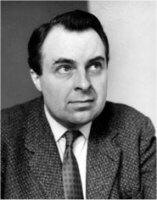|
In Remembrance: Nigel Kneale
Born on April 18, 1922 on the Island Of Man, England, Kneale left home in his early 20s, initially to work as an actor, but soon changed his career goals to writing, publishing the short story collection Tomato Cain And Other Stories in 1949. He was hired by the BBC in 1948 to script radio plays and was one of the first staff writers when the BBC moved into television production.
In 1953 Kneale created the science fiction serial The Quatermass Experiment, in which a manned mission into space ends in disaster, leaving a British rocket scientist to battle an alien invasion. The series ran six episodes and was a popular success, spawning two sequel series- Quatermass II and Quatermass And The Pit. The first two serials were adapted for the silver screen by British director Val Guest as The Quatermass Xperiment (released in the United States as The Creeping Unknown, 1955) and Quatermass 2 (released in the United States as Enemy From Space, 1957). Although he only received a story credit on the first film, Kneale collaborated with Guest on the screenplay for the second film. Kneale also wrote the screenplay for the big screen version of the third Quatermass serial, released in the United States as Fifty Million Years To Earth in 1967.
Kneale’s skill at creating suspenseful horror stories made him a natural fit at England’s Hammer Films where he scripted such films as The Abominable Snowman (1957) and The Witches (1966). His H. G. Wells adaptation, The First Men In The Moon (1964), showcased exciting visual effects from master Ray Harryhausen. Kneale would earn two BAFTA award nominations for Best Screenplay for the film adaptations of Look Back In Anger (1958) and The Entertainer (1960), both based on John Osborne plays.
Kneale’s television writing not only proved powerful and popular but prophetic as well. His 1954 adaptation of George Orwell’s novel 1984 was so powerful and shocking that its suitability for broadcast television was debated in the House of Commons. His 1968 teleplay The Year Of The Sex Olympics imagined a future where reality television placed contestants into a home filled with television cameras, much like the current BBC series Big Brother and its United States version. Kneale’s teleplay for the 1972 television movie The Stone Tapes is also considered a classic. Kneale also wrote the 1962 naval drama H. M. S. Defiant (released in the United States as Damn The Defiant!) and the 1987 drama Gentry. An edited version of the 1979 four-hour BBC miniseries titled simply Quatermass was edited down to 100 minutes and released theatrically in the United States as The Quatermass Conclusion.
Following the less than successful Halloween 2 (198-), producers John Carpenter and Debra Hill approached Kneale with the intent of moving the horror franchise away from the character of killer Michael Myers and towards an anthology format which would present different scary stories each year. Although Carpenter would eventually reject the script that Kneale would turn in, some story elements still remained in the resultant film- Halloween III: Season Of The Witch (1982). Kneale continued to write for television until he retired in the late 1990s. His original Quatermass Experiment was remade in 2005 by the BBC as a live production starring Jason Flemyng and David Tennant.
Kneale’s work has been said to have inspired numerous other science-fiction films and television shows. He reportedly had turned down offers to write for two of the best known of those shows- The X-Files and Britain’s Doctor Who. |
 Nigel Kneale, the British writer whose Quatermass science
fiction serials for the BBC were adapted onto the big screen, has
passed away on October 29, 2006 in London, England. He was 84.
Nigel Kneale, the British writer whose Quatermass science
fiction serials for the BBC were adapted onto the big screen, has
passed away on October 29, 2006 in London, England. He was 84.